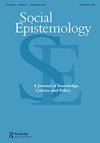Non Experts: Which Ones Would Trust You?
IF 1.4
2区 哲学
Q1 HISTORY & PHILOSOPHY OF SCIENCE
引用次数: 1
Abstract
ABSTRACT Following Goldman’s seminal work, most contemporary philosophical contributions on the novice-expert relation have adopted a normative, expert-focused approach. In this paper, we aim to shift the focus of the philosophical analysis towards the characteristics of the novices, and how they might determine the choices that experts make. On the bases of recent empirical evidence from social psychology, we discuss how novices evaluate the messages that they receive and distinguish diverse kinds of novices according to their competence in message assessment. Building on that analysis, we discuss the difficulties of approaches to expertise that focus only on the standpoint of novices or assume novices are homogeneous. In our analysis, we introduce the standpoint of experts, and we pay special attention to the heterogeneity of novices. This approach allows us to identify and address the difficulties faced by experts in the context of science communication. In the last part of the paper, we characterise and discuss the problem of experts when choosing a strategy in the issuing of a public campaign to advise or inform certain populations of novices.非专家:谁会相信你?
摘要继戈德曼的开创性工作之后,当代大多数关于新手专家关系的哲学贡献都采用了规范的、以专家为中心的方法。在本文中,我们的目的是将哲学分析的重点转移到新手的特征上,以及他们如何决定专家的选择。基于社会心理学的最新经验证据,我们讨论了新手如何评估他们收到的信息,并根据他们的信息评估能力来区分不同类型的新手。在这一分析的基础上,我们讨论了只关注新手的观点或假设新手是同质的专业知识方法的困难。在我们的分析中,我们引入了专家的观点,并特别注意新手的异质性。这种方法使我们能够识别和解决专家在科学传播方面面临的困难。在论文的最后一部分,我们描述并讨论了专家在发布公共运动以建议或告知某些新手群体时选择策略的问题。
本文章由计算机程序翻译,如有差异,请以英文原文为准。
求助全文
约1分钟内获得全文
求助全文
来源期刊

Social Epistemology
Multiple-
CiteScore
2.60
自引率
17.60%
发文量
60
期刊介绍:
Social Epistemology provides a forum for philosophical and social scientific enquiry that incorporates the work of scholars from a variety of disciplines who share a concern with the production, assessment and validation of knowledge. The journal covers both empirical research into the origination and transmission of knowledge and normative considerations which arise as such research is implemented, serving as a guide for directing contemporary knowledge enterprises. Social Epistemology publishes "exchanges" which are the collective product of several contributors and take the form of critical syntheses, open peer commentaries interviews, applications, provocations, reviews and responses
 求助内容:
求助内容: 应助结果提醒方式:
应助结果提醒方式:


